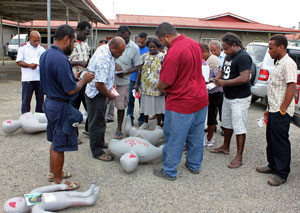Emergency workers in Honiara now have up-to-date skills to deal with a major incident following two days of intensive training at the National Referral Hospital.
Doctors, nurses, paramedics, police and ambulance officers, along with key logistics, disaster management and security officers, took part in the training last week to better prepare for mass casualties in an emergency or disaster.
Dr Ian Norton, Director of the Disaster Preparedness and Response from the National Critical Care & Trauma Response Centre (NCCTRC) at Royal Darwin Hospital, ran the training, which was funded by the Australian aid program.
Dr Norton–who led the Australian emergency medical team deployed to Solomon Islands to help manage the dengue fever outbreak earlier this year–said the Major Incident Medical Management and Support training teaches first responders both the principles and practical aspects of emergency and disaster management.
'The training was important for medical and emergency first responders to ensure they have skills to manage an emergency situation,' Dr Norton said.
'The training covered lectures, discussion and skills around emergency actions and response, followed by practical exercises and scenarios. This ranged from setting up a safe triage and treatment area, to management of casualty clearing posts and transport of patients to hospital.'
Through the training, a mass casualty plan for the National Referral Hospital was developed, including ways to strengthen the emergency department and to train and practise key clinical and support staff in the plans.
'The training supports the hospital emergency operations centre and Ministry of Health to develop a set of emergency response plans, including for the provinces, in the event of another mass casualty event like this year's dengue outbreak,' Dr Norton said.
Australian High Commissioner to Solomon Islands Matt Anderson said this is the third phase of Australian support to the Ministry of Health's disaster and emergency response, following the dengue fever outbreak earlier this year.
'Through Australia's support, the NCCTRC provided emergency medical support to respond to the dengue fever outbreak in Solomon Islands earlier this year, and the emergency training is the final tranche of assistance to build local capacity of medical and first responders.'
'The training is timely leading into a new cyclone season. The better prepared everyone is, especially first responders with the right skills, could make the difference between life and death in a disaster or emergency,' Mr Anderson said.

